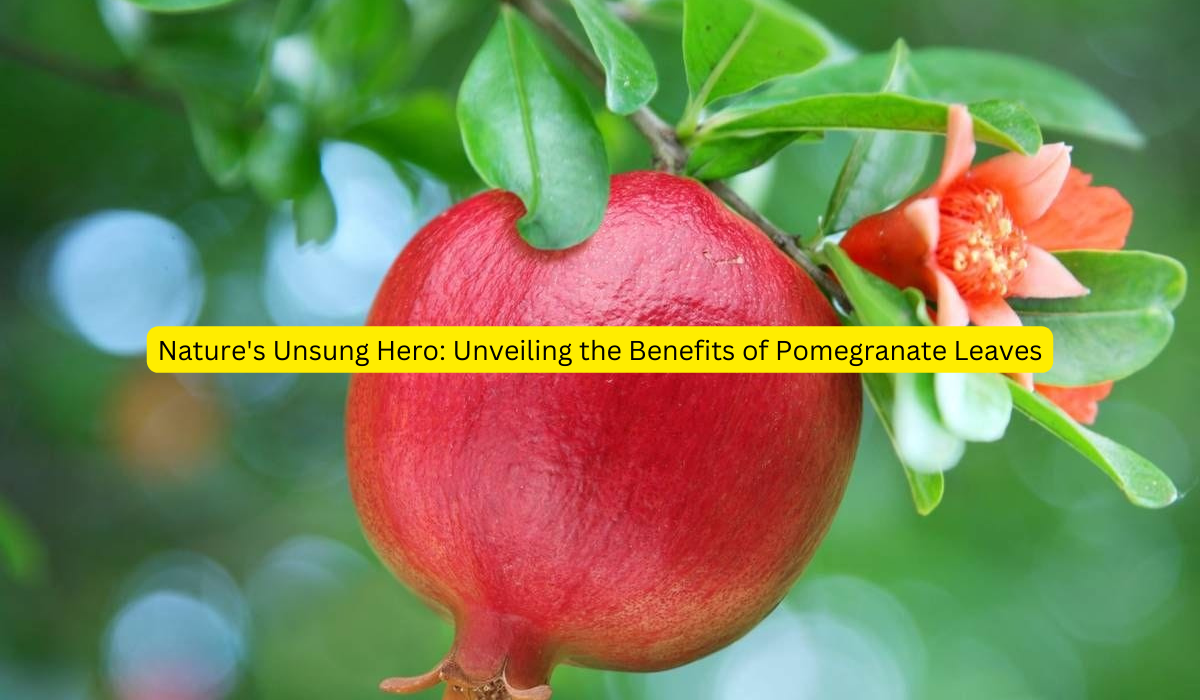Pomegranates. Those jewel-toned fruits bursting with ruby-red seeds aren’t just a delicious treat; they’re a treasure trove of health benefits. But did you know that the humble pomegranate leaves, often discarded, hold a surprising amount of health-promoting properties as well? Let’s ditch the spotlight on the fruit for a moment and delve into the fascinating world of pomegranate leaves and explore how they can benefit your well-being.
Beyond the Fruit: Unveiling the Power of Pomegranate Leaves
Pomegranate leaves boast a unique profile of compounds that contribute to their potential health benefits. Here are some key players:
- Antioxidants: Pomegranate leaves are rich in antioxidants, which act as tiny warriors fighting free radicals that damage your cells. Imagine them as nature’s bodyguards, keeping your cells healthy and protected.
- Anti-inflammatory Properties: Pomegranate leaves contain compounds that might help reduce inflammation in the body. Think of them as a natural pain reliever, offering a soothing effect on various inflammatory conditions.
- Antimicrobial Potential: Studies suggest that pomegranate leaves might possess antimicrobial properties, potentially aiding in the fight against harmful bacteria. Imagine them as nature’s defense system, helping to keep you healthy.
It’s important to remember that most research on pomegranate leaves is still in its early stages. While the potential benefits are promising, further studies are needed to fully understand their effectiveness and optimal use.
The Powerhouse Potential: Unlocking the Benefits of Pomegranate Leaves
Pomegranate leaves offer a variety of potential benefits for your health:
- Digestive Aid: Pomegranate leaf teas and extracts have been traditionally used to soothe digestive issues like diarrhea and stomach pain. Think of them as a gentle nudge to get your digestive system back on track.
- Oral Health Support: Pomegranate leaves might possess properties that can help combat bad breath and promote oral hygiene. Imagine them as a natural mouthwash, keeping your breath fresh and your smile healthy.
- Blood Sugar Management: Early research suggests that pomegranate leaves might have a role in blood sugar regulation. This could be potentially helpful for individuals managing diabetes or prediabetes.
- Wound Healing: Pomegranate leaves might possess properties that aid in wound healing. Think of them as a natural bandage, promoting tissue regeneration and faster recovery.
While these benefits are promising, it’s crucial to consult your doctor before incorporating pomegranate leaves into your routine, especially if you are pregnant, breastfeeding, or taking any medications.
Brewing Up Benefits: How to Enjoy Pomegranate Leaves
There are several ways to incorporate pomegranate leaves into your routine:
- Tea Time: Steep dried pomegranate leaves in hot water to create a healthy and potentially beneficial tea. You can add a touch of honey or lemon for a personalized flavor twist.
- Powder Power: Ground pomegranate leaves can be found in some health food stores. Mix a small amount of the powder into yogurt, smoothies, or even sprinkle it on salads for an added nutritional punch.
- Supplement Savvy: Pomegranate leaf supplements are also available in capsule form. Always consult your doctor before starting any new supplements, and ensure you purchase them from reputable sources.
Remember, consistency is key! Regularly incorporating pomegranate leaves, alongside a healthy lifestyle, might offer the best chance of experiencing their potential benefits.
The Final Sip: A Promising Addition to Your Wellness Journey
Pomegranate leaves might be a hidden gem in the world of natural remedies. While research is ongoing, their potential benefits for digestion, oral health, blood sugar management, and wound healing are certainly intriguing. Whether you enjoy them as a soothing tea, a sprinkle in your smoothie, or a convenient capsule, pomegranate leaves offer a unique and potentially powerful addition to your wellness journey.
Frequently Asked Questions
1. Are there any side effects associated with consuming pomegranate leaves?
While pomegranate leaves are generally considered safe for most people in moderation, some potential side effects exist:
- Allergic Reactions: If you have allergies to other plants like myrtle or cashews, you might be allergic to pomegranate leaves as well. Start with a very small amount and monitor for any allergic reactions like itching, swelling, or difficulty breathing.
- Digestive Discomfort: In high doses, pomegranate leaves might cause digestive discomfort like nausea or diarrhea. Start with a small amount and gradually increase intake to allow your body to adjust.
- Drug Interactions: Pomegranate leaves might interact with certain medications. Consult your doctor before consuming pomegranate leaves if you take any medications, especially blood pressure medications or blood thinners.
2. How much pomegranate leaf tea is safe to drink daily?
There isn’t a definitive answer to this question as research on safe dosage is ongoing. However, it’s generally recommended to limit yourself to 2-3 cups of pomegranate leaf tea per day. Start with a single cup and monitor your body’s response. If you experience any discomfort, discontinue consumption and consult your doctor.
3. Can I apply pomegranate leaf tea directly to wounds for faster healing?
While pomegranate leaves might possess wound healing properties, applying concentrated tea directly to open wounds is not recommended. Wounds require proper cleaning and sterile care to prevent infection. Consult your doctor for proper wound care techniques before using any herbal remedies on open wounds.
4. Are there any restrictions on using pomegranate leaf supplements?
Pomegranate leaf supplements haven’t been extensively studied, and dosage recommendations can vary depending on the brand and concentration. Here are some crucial points to remember:
- Consult your doctor: Always consult your doctor before starting any new supplements, especially if you have any underlying health conditions or take medications.
- Dosage Guidance: Follow the recommended dosage instructions on the supplement label and avoid exceeding them.
- Source Matters: Purchase pomegranate leaf supplements from reputable brands known for quality and safety standards.
5. Can children consume pomegranate leaves or supplements?
The safety of pomegranate leaves for children hasn’t been thoroughly established. It’s best to avoid giving pomegranate leaves or supplements to children unless specifically recommended by a pediatrician.

